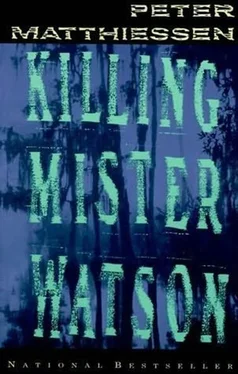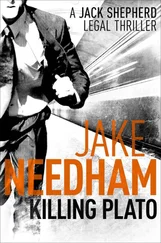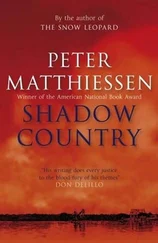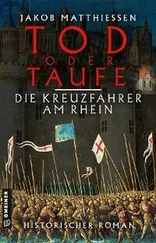Peter Matthiessen - Killing Mister Watson
Здесь есть возможность читать онлайн «Peter Matthiessen - Killing Mister Watson» весь текст электронной книги совершенно бесплатно (целиком полную версию без сокращений). В некоторых случаях можно слушать аудио, скачать через торрент в формате fb2 и присутствует краткое содержание. Жанр: Современная проза, на английском языке. Описание произведения, (предисловие) а так же отзывы посетителей доступны на портале библиотеки ЛибКат.
- Название:Killing Mister Watson
- Автор:
- Жанр:
- Год:неизвестен
- ISBN:нет данных
- Рейтинг книги:4 / 5. Голосов: 1
-
Избранное:Добавить в избранное
- Отзывы:
-
Ваша оценка:
- 80
- 1
- 2
- 3
- 4
- 5
Killing Mister Watson: краткое содержание, описание и аннотация
Предлагаем к чтению аннотацию, описание, краткое содержание или предисловие (зависит от того, что написал сам автор книги «Killing Mister Watson»). Если вы не нашли необходимую информацию о книге — напишите в комментариях, мы постараемся отыскать её.
Killing Mister Watson — читать онлайн бесплатно полную книгу (весь текст) целиком
Ниже представлен текст книги, разбитый по страницам. Система сохранения места последней прочитанной страницы, позволяет с удобством читать онлайн бесплатно книгу «Killing Mister Watson», без необходимости каждый раз заново искать на чём Вы остановились. Поставьте закладку, и сможете в любой момент перейти на страницу, на которой закончили чтение.
Интервал:
Закладка:
The prisoner looked out the window at the crowd, then went back into his cell and lay down on his bunk. Sheriff said, What is the matter, and the stranger said kind of ironical he didn't think the going looked so good. Not enough evidence to hold you, Sheriff Ollie explained, and this way, you got you a fighting chance. Lock that door, his prisoner said. I'll sleep better behind bars.
But later the stranger sent some money to treat the crowd at a saloon some distance up the street, and toward daybreak, with the mob distracted, the sheriff rode him to the edge of town, told him to go to hell and stay there. The stranger grinned into the sheriff's face. Said, What makes you think we ain't arrived already?
Remembering those words, Sheriff Ollie shook his head. "That damn Jack Watson was the most friendliest sonofagun I ever met," he told me.
"You mean Ed Watson, don't you?" I said. "Ed Watson?" Sheriff Dishong shook his head again. "Must be gettin old. Did I say Jack?"
That story got me kind of interested in being a lawman, but I had a career or two before that time, had some education. I was fifteen years of age when I took work as a printer's devil for the new Fort Myers Press, which in a town of about three hundred people was glad to come up with any news at all. That was 1884, when a typical headline story was the Debating and Literary Society's first meeting to decide the question "Are Women Intelligent Enough to Vote?" (Stamping their feet, the panel voted in the affirmative, at least in regard to the fair sex of Fort Myers.) In that same year I set in type the first advertisement for Roan's general store, offering top prices for deerskins, gator hides, and bird plumes. It was also the year of the first visit to "our fair city" of America's "electrical wizard," Thomas Alva Edison, who bought Sam Summerlin's place on Riverside Avenue-that's MacGregor now-and would one day make Fort Myers his winter home. And it was the year Jim Cole showed up in town. In those days, even Jim Cole was a "first."
The following year, the Press covered the big celebration at the river-balloons, fireworks, and oyster roast-when Grover Cleveland became the first Democratic president in a quarter century. That put an end to Reconstruction, those terrible dark years when nigras got treated better than the white people.
After four years as a printer's devil, I was sick of indoor life. I took a job with the Hendrys as a "cow hunter," rounding up the long-horned cattle scattered through the Cypress. Sometimes I rode all the way east to the Everglades, long silent days under the broad sky in the hard fierce light of the Glades country, lost in the creak of my old worn-out saddle and my horse blowing and hot wind whispering in the pines. For long years afterward I missed the stillness of the Big Cypress, the slow time of those horseback days, the hunting and fishing for the cow camp, the slow cooking fires, the simple sun-warmed tools of iron, wood, and leather, the resin scent of the pine ridges, the stomp of hoof and bawl of cattle, the wild things glimpsed, wild creatures, the echoing silence pierced far and near by the sharp cry of a woodpecker or the dry sizzle of a rattler, and always the soft blowing of my woods pony, a small short-bodied roan. Race could find the short way home from Hell, "could turn on a dime and give back nine cents change," as the old hands said. Had me a good cow dog, Trace, for turning cattle, and was a fair hand with the braided buckskin whip that served us cow hunters as lariat.
Each time our cattle pens were moved, an Indian family would move in behind and plant new gardens in that fertile, sod-broke ground, sweet potatoes the first year, then corn and peanuts. Because they were forever watching, they came in almost overnight. I used to wonder what Indians thought of the Disston Company's rusting dredge far out to the east toward Okeechobee, that looming shape on the sparkling horizon of what the Seminoles called Grass River, Pa-hay-okee, and the hellish noise and smoke and smell of it, all gone now, and not one damned thing accomplished, only the unholy ruin of the beautiful Calusa Hatchee. The old silence had returned, but the white man's machine still rose above that river of white sacred sand that had filled with mud and would never come clear again. This was the dredge Ed Watson aimed to use at Lost Man's River.
In the nineties, I became friendly with Walt Langford, who was a cow hunter for his father's partners. Young Walt was a hard rider, too, with the sharpest eye south of the river for a stray cow hidden in the scrub. But Walt always wanted to be liked too much, he aimed to show he was not just a rich cattleman's son but a regular feller, so he led in the boozing and the brawling, the whooping, galloping, and gunfire, that kept nice people shuttered up on Saturday afternoons. Fort Myers was never so uproarious as Arcadia, we never had real cattle wars or hired guns. All the same, this Saturday pandemonium reminded the upset citizens that our new Lee County capital was still a cow town, on the wrong side of that slow broad river, falling farther and farther behind the country's progress.
Many a long day I spent alone out in the Cypress, but the lonely day was Saturday, when the other riders, already half-drunk, yipped and slapped off through the trees to spend their week's pay in the saloons of Fort Myers.
On Sundays I helped serve the flock at the Indian mission at Immokalee, riding twenty miles or more to attend the service. The Indians could not follow the sermon, but they came anyway to watch the white people. They sat in circles on the floor. Pretty soon, I quit my job for full-time work at the Indian mission. I was still there in 1897 when I first heard how this E.J. Watson, a leading planter in the Islands, was supposed to be the killer of Quinn Bass, and the lovely young girl at Doc Langford's house was this outlaw's child. Carrie, going on thirteen, was a strong, willowy young lady with big dark eyes, black hair to her waist, and a high bosom. When I first saw that vivacious young creature skipping rope in front of Miss Flossie's notions store, I knew that she and I were some way fated. When the time came, I would ask her daddy for her hand in marriage, and shake his desperado's hand at the same time.
Cattlemen had run this town before it was a town at all, starting way back with Old Jake Summerlin at Punta Rassa. Old Jake was ruthless, people said, but at least he had cow dung on his boots. These new cattlemen, Jim Cole especially, worked mostly with paper, brokering stock they had never seen, let alone smelled. In recent years, with Doc Langford and the Hendrys, who bought out the Summerlins at Punta Rassa, Cole made a fortune provisioning the Rough Riders. One July day of 1899, according to the Press, these patriot-profiteers shipped three thousand head from Punta Rassa to their Key West slaughterhouse for butchering and delivery to Cuba.
Meanwhile, Jim Cole made a second fortune on Cuban rum, smuggled in as a return cargo on his cattle schooners, and naturally the cattlemen led the fight against liquor prohibition that the Women's Christian Temperance Union was supporting. The "drys" won in 1898, thanks to the accidental shooting death of a drunk cowboy. The saloon of Taff O. Langford was shut down, and two years passed before the "wets" could put Taff back in business. But the cattlemen still lived by their own rules, and Sheriff Tom Langford drank bootlegged rum at the wedding party in July when Walt Langford took the hand of Miss Carrie Watson.
Though I opened my livery stable that same year, I had some ideas about running for sheriff in the 1900 elections. I was shoeing a horse when this Jim Cole, who had got wind of my ambition, came in and offered me his help, having already figured what I hadn't understood, that I was pretty sure to win without him. Folks was real restless under the rule of cattle kings who ignored all protests against cattle in the streets, and the lard-assed incumbent, Sheriff Langford, had lost most of his support for covering up for the cowboys in that shooting.
Читать дальшеИнтервал:
Закладка:
Похожие книги на «Killing Mister Watson»
Представляем Вашему вниманию похожие книги на «Killing Mister Watson» списком для выбора. Мы отобрали схожую по названию и смыслу литературу в надежде предоставить читателям больше вариантов отыскать новые, интересные, ещё непрочитанные произведения.
Обсуждение, отзывы о книге «Killing Mister Watson» и просто собственные мнения читателей. Оставьте ваши комментарии, напишите, что Вы думаете о произведении, его смысле или главных героях. Укажите что конкретно понравилось, а что нет, и почему Вы так считаете.












